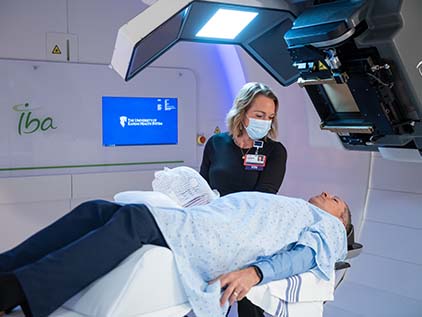Stomach Cancer

Stomach, or gastric, cancer is an abnormal growth of cells in the lining and wall of the stomach. Stomach cancer has declined dramatically in the U.S. since 1930; however, it remains a leading cause of cancer death worldwide.
Stomach cancer treatment specialists at The University of Kansas Cancer Center are leaders in the field. They work as a team to provide you with the latest advances in prevention, diagnosis, treatment and resources.
What is stomach cancer?
Stomach cancers tend to develop slowly over many years. Most stomach cancers start in the cells of the stomach’s innermost lining, called the mucosa. Cells begin to grow out of control, and while the cancer grows slowly, it can spread into other layers of the stomach. Treatment for stomach cancer depends on its location in the stomach and its progression.
Stomach cancer symptoms and risks
We don’t know the exact cause of stomach cancer, but we do know that certain things increase your risk of getting it. By changing or adjusting your lifestyle, you may be able to reduce your risks.
Stomach cancer risk factors
You are more likely to get stomach cancer if you:
- Are overweight or obese
- Drink alcohol
- Eat a diet rich in smoked foods, salted fish or seafood caught in the ocean, salted meat and pickled vegetables
- Have a history of Helicobacter pylori or other bacterial infections of the stomach
- Have had previous stomach surgery
- Smoke
A diet rich in whole grains, fresh fruits and vegetables may lower your risk of stomach cancer prognosis.
Stomach cancer symptoms
Common symptoms and signs of stomach cancer include:
- A sense of fullness in the upper abdomen, just below the chest bone after eating a small amount of food
- Abdominal pain or vague discomfort
- Heartburn or indigestion
- Nausea or vomiting, especially if blood is present
- Swelling of the abdomen
- Unintended weight loss and lack of appetite


Stomach Cancer Screening and Diagnosis
To detect and diagnose stomach cancer, our doctors perform thorough exams. They ask questions about your medical history and current symptoms. They will evaluate you using the latest technology, including:
- Biopsy: A biopsy is often necessary. If so, the doctor will remove a sample of stomach tissue during an endoscopy. The tissue sample goes to the lab. It’s looked at under a microscope to help diagnose your condition.
- CT scan: A CT or CAT scan uses X-rays to make a detailed picture of the structures inside your body. You lie on a table while the scanner sends a series of X-ray pulses through your body. An iodine dye (contrast material) injected into your vein makes structures and organs easier to see on the CT pictures.
- Endoscopic ultrasound: We are one of the few providers in the region offering endoscopic ultrasound. By combining the technologies of endoscopy and ultrasound, EUS greatly improves the ability to diagnose and treat stomach cancer.
- Positron emission tomography scan: The PET scan uses a special camera to see organs in the body. The camera records a tracer (radioactive sugar) that is put into a vein. Cancer cells use more sugar than normal cells, so the tracer shows up in the cancer cells.
- Upper gastrointestinal endoscopy: An upper gastrointestinal endoscopy allows your doctor to look at your esophagus, stomach and part of your small intestine. While you are sedated, a tube is inserted into the mouth. At the end of the tube is a tiny camera that lets the doctor see inside the stomach.
These tests help your healthcare team detect stomach cancer, pinpoint its location, decide what kind of stomach or gastric cancer it is, learn how far it has spread and develop a gastric cancer treatment plan.
Stomach cancer treatment
Treatments for stomach cancer depend on the location and stage of cancer. Doctors at The University of Kansas Cancer Center are leaders in their field and will work with you to develop a personalized treatment plan that can include any of these treatment options.
Surgery
Surgery is an option if the cancer has not spread to other areas of the body. During surgery, part or all of your stomach may be removed. It may be a few weeks before you can eat normally again.
Chemotherapy
Chemotherapy uses medicines to destroy cancer cells or to alter their metabolism. You may receive it before or after surgery.
Our doctors have also helped develop new chemotherapy drugs, based on clinical studies. These drugs treat specific cells or the way cells grow. They include:
- Targeted therapies that kill cancer cells without affecting healthy cells
- Drugs that prevent the formation of blood vessels that feed tumors
These can be used with regular chemotherapy and surgery, when needed.
Radiation
Radiation therapy uses high-dose X-rays to kill cancer cells and shrink tumors. You may receive radiation to your stomach or to other areas where the cancer has spread.
Proton therapy
Proton therapy is the leading-edge form of radiation treatment currently available. Proton therapy is a form of external beam radiation that uses energized protons to deliver radiation to a tumor.
Clinical Trials
Some people with stomach cancer take part in clinical trials. Clinical trials are research studies to help find better ways of preventing, diagnosing and treating stomach cancer.
Why choose us for stomach cancer care



Start your path today.
Your journey to health starts here. Call 913-588-1227 or request an appointment at The University of Kansas Cancer Center.